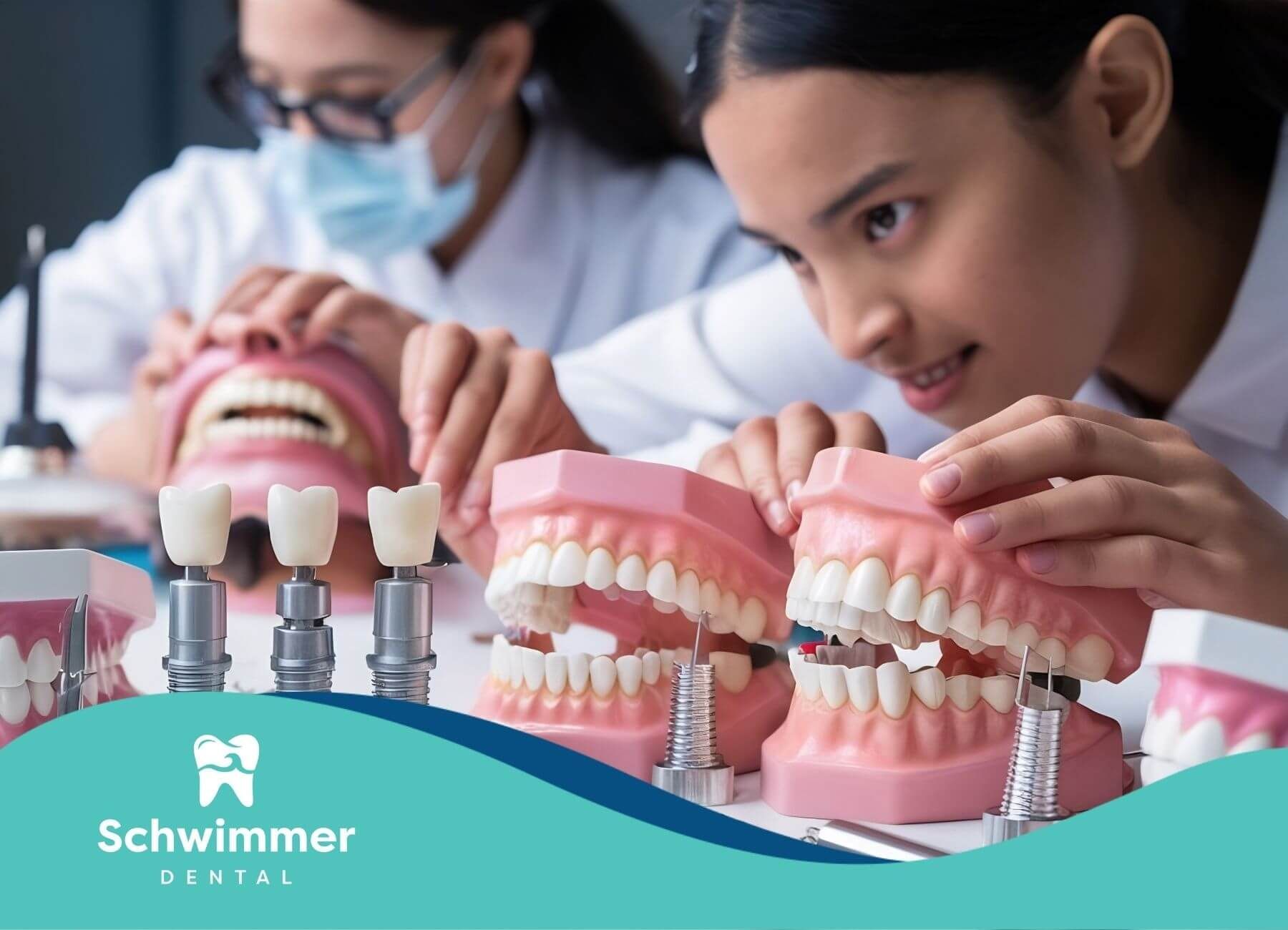Is It Normal for Kids to Cry at the Dentist? Common Concerns
Key Highlights
- It’s not unusual for kids to cry at their first dental visit due to unfamiliarity, fear, or dental anxiety.
- Pediatric dentists specialize in making dental visits comfortable for children with techniques like positive reinforcement and kid-friendly environments.
- Common triggers for dental fears in children include the fear of pain, discomfort with dental instruments, and unfamiliar surroundings.
- Parents play a significant role in easing their child’s fears by discussing oral health positively and modeling a calm approach.
- Preparing your child with games like “pretend dentist” and scheduling wisely builds their confidence for their dental appointments.
Introduction
Taking your child to the pediatric dentist can sometimes lead to tears, especially during their first dental visit. This crying often comes from dental anxiety, a common feeling in young ones when faced with new places and routines. However, these visits are important for building good lifelong oral health. If you understand your child’s fears and deal with them early, these appointments can feel less scary and even enjoyable! With some good preparation, the dentist's office can be a comfortable place for your little one.
Understanding Why Kids Cry at the Dentist
Children crying at the dentist is normal and usually temporary as they get used to the experience. A dental visit brings new sights, sounds, and feelings that can be a lot for them to handle. Adults often feel nervous in the dentist’s office, so it makes sense that kids might cry a little.
These tears often show dental fears, like worries about pain or discomfort. However, with patience and preparation, children can learn to see these visits as safe and even fun parts of their routine.
Common Reasons for Dental Anxiety in Children
For many young kids, going to the dentist’s office can cause them to feel nervous. One big reason is the fear of pain. This fear often grows from stories they’ve heard or past memories of shots and needles. The shiny, new dental instruments can seem scary, making dental fears start even before the dentist begins.
Another reason is the fear of the unknown. Kids like familiar places, so a new room with strangers in masks can feel strange and disrupt their personal space. This feeling can lead to tears and wanting to avoid the visit.
Lastly, past experiences are important too. If a child had pain, like when dealing with cavities, it can cause them to feel worried for future visits. Knowing these feelings can help you and your pediatric dentist make the dental appointment easier for your child.
Signs Your Child Might Be Afraid of Dental Visits
Not all anxious children express their worries straight out. Some may show quiet signs. For example, they might avoid talking about their upcoming dental appointment or act upset when it's time to go. This kind of avoidance often means they are scared.
Other signs may include physical feelings like sweating, stomach aches, or not wanting to sit in the dentist’s chair. These actions usually happen when the fear feels strong, showing their discomfort with the situation.
Emotional signals, like crying, holding onto a parent, or becoming quiet unexpectedly, are other signs to notice. By spotting these behaviors early and understanding what scares your child, you can help ease their worries before dental fears set in. This can make future appointments go more smoothly.
Preparing Your Child for the Dentist: A Beginner's Guide
A child who is ready is less likely to feel scared during their first dental visit. Talk about why oral health is important in a simple and happy way. Highlight how strong and healthy teeth help them chew, smile, and grow.
You can also do role-playing games, like pretending to go to a good dentist. This helps children get used to what will happen. By making the visit sound fun and adding little surprises, like their favorite toy, you will help calm their nerves for the big day.
What You Will Need for a Successful Dental Visit
Preparing for your child's first dental visit can really help. Here’s what you need to make sure it goes well:
- Positive reinforcement: Praise your child for being brave and helpful, even in small ways. This builds their confidence.
- Comfort objects:
Bring something familiar, like their favorite stuffed animal or blanket. This will help them feel safe.
- A good dentist: Find a pediatric dentist who makes kids feel welcome and happy.
Also, think about when to schedule the appointment. Choose a time when your child is in a good mood, like mornings after they have slept well. Lastly, try not to give them too much information before the visit. Too many details might raise dental fears instead of calming them.
Step-by-Step Guide to Easing Your Child into Dental Care
Helping your child with their fears of the dentist takes time and regular efforts. Start by making dental care fun at home. Let them join in activities like brushing and flossing regularly.
Next, take them to see a parent’s or older sibling’s dental appointment. Seeing someone they trust go through it can help them feel that it is safe and even enjoyable. Use this time to answer any questions they may have and help them feel more at ease.
Lastly, keep in touch with your child’s pediatric dentist. Tell the dental team about your child's worries. They can adjust the visit to make sure your child feels safe and understood. With time and regular visits, many anxious children become comfortable patients.
Step 1: Discuss the Importance of Oral Health
Start talking about oral health early. Use simple words to explain how taking care of teeth stops cavities and keeps their smile bright. Tell them that the dentist is a helpful friend who helps their teeth stay strong and clean.
Use relatable examples. For instance, say how brushing gets rid of “sugar bugs” that make holes (cavities) in teeth. Explain that a dental cleaning is like giving their teeth a bath. This sounds less scary than using complicated terms!
Be patient when they ask questions. If your little kiddo is worried, respond in a positive way. For example, say that every time they sit in the chair, they become a “tooth hero” by protecting their smile. This helps your child understand how important regular visits are, and they will see their dental appointment as something good instead of being afraid.
Step 2: Play Pretend Dentist Games at Home
Pretend dentist games are a great way to help your child know what to expect at the dentist’s office. You can take turns being the dentist and the patient. Use a flashlight and their toothbrush to pretend to clean teeth.
This fun activity gives kids a sense of control. It helps them feel less nervous about their real visit. They also learn what happens during an appointment, without being scared of anyone invading their personal space. You can use stuffed animals or dolls for more fun and less stress.
While playing, remind your child that the dentist is there to “keep sugar bugs away” and to take care of their teeth. Talk to them about their fears of the dentist in a caring way. This will help to remove any negativity. With time, this game can help build trust and excitement for their upcoming appointment.
Conclusion
In conclusion, it's normal for kids to cry at the dentist. Many children have dental anxiety. Knowing why they may be afraid and getting ready for their visit can help a lot. Talking about oral health and using fun activities can help kids feel better about going to the dentist. With these strategies, you can help your child feel more confident and more comfortable in the dentist chair. If you still have worries or want advice that suits your child, feel free to ask for help.
Frequently Asked Questions
Is it normal for kids to cry at the dentist?
It’s completely normal for kids to cry at dental visits. This often happens in the United States because many children are scared of the dentist. The strange place, the dental work, and the thought of general anesthesia can make them upset. Dentists come from dental school and know how to handle these situations with care.
How can I comfort my child before visiting the dentist?
To help your child deal with dental fears or fear of pain, start by calmly talking about what will happen. The first thing to do is create a positive outlook without talking about any bad experiences from before. Use easy words, listen to their different reasons for feeling anxious, and let them know they will get good care.
SOURCES:
https://pmc.ncbi.nlm.nih.gov/articles/PMC6784363/
https://www.betterhealth.vic.gov.au/health/conditionsandtreatments/dental-anxiety-and-phobia
https://www.sciencedirect.com/science/article/pii/S0300571224000113
https://www.colgate.com/en-us/oral-health/dental-visits/anxiety-over-a-dental-appointment-how-to-ease-your-childs-worries
https://www.carecredit.com/well-u/health-wellness/babys-first-dental-visit/



